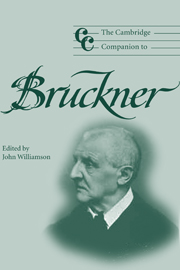15 - Conductors and Bruckner
from Part IV - Reception
Published online by Cambridge University Press: 28 September 2011
Summary
Maestros, mystics, and monuments
In the Linz Bruckner Symposium of 1982, specifically devoted to interpretation, Daniel Barenboim gave a lecture whose title, ‘Mystische Erfahrung’, is symptomatic of the celebrity conductor's relationship to the cult of the mystic Bruckner. In an extreme form it can be seen in the publicity for the appearance of Celibidache's Munich recordings of Bruckner in Music Theory Online. The writer took pains to link ‘the last surviving great genius of conducting’ to ‘an entirely new and extremely moving Bruckner’. The reminiscences of a member of the Munich Philharmonic detailed the maestro's unusually protracted tempi, extreme demands on players, and the level of abuse that accompanied them. The interpretations, at which people wept openly, were ‘more than mere music’, and ‘clothed the soul of the listener’ like ‘running water’. When not screaming abuse at violinists, Celibidache was a nice man who loved dogs.
A strange Bruckner did indeed emerge, characterized by a breadth of tempo that at times verged on the eccentric. Such passages as the extraordinarily slow coda to the Fourth Symphony's Finale presented a vision that seemed to represent the maestro cult's rage at the lack of truly creative powers. Against this there were moments, and indeed whole movements, that illuminated Bruckner's ideas. Comparison of these eccentric performances with those from his earlier Stuttgart years suggested that extreme breadth came late to Celibidache's Bruckner; in this he played out another element of the maestro cult, the ‘Olympian’ wisdom that comes to conductors with age in the form of increasingly slower tempi.
- Type
- Chapter
- Information
- The Cambridge Companion to Bruckner , pp. 229 - 243Publisher: Cambridge University PressPrint publication year: 2004
- 1
- Cited by



